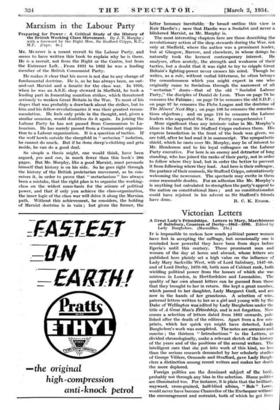Marxism in the Labour Party
Preparing for Power : A Critical Study of the History of the British Working Class Movement. By J. T. Murphy ; with a foreword by the Right Hon. Sir Stafford Cripps, K.C., M.P. (Cape. Gs.) Mn. MURPHY is a recent recruit to the Labour Party, and seems to have written this book to explain why he is there. He is a recruit, not from the Right or the Centre, but from the Extremer Left. , From 1921 to 1932 he was a leading member of the British Communist Party.
He makes it clear that his move is. not due to any change of fundamental doctrine. He is, as he has always been, an out- and-out Marxist and a fanatic for the class war. In 1916, when he was an A.S.E. shop steward in Sheffield, he took a leading part in fomenting munition strikes, which threatened
seriously to weaken Great Britain in the War. To most of his dupes that was probably a drawback about the strikes, but to him and his fellow-revolutionaries it was their greatest recom- mendation. He feels only pride in the thought, and, given a similar occasion, would doubtless do it again. In joining the Labour Party he has not passed from Communism to La- bourism. He has merely passed from a Communist organiza- tion to a Labour organization. It is a question of tactics. If the wolf howls outside the sheepfold in " sectarian " isolation, he cannot do. much. But if he dons sheep's-clothing and gets inside, he can do a good deal.
So simple a thesis might, one would think, have been argued, pro and con, in much fewer than this book's 286 pages. But Mr. Murphy, like a good Marxist, must persuade himself that history is on his side. So he goes right through the history of the British proletarian movement, as he con- ceives it, in order to prove that " sectarianism " has always been a mistake, that the right plan is to organize the working- class on the widest mass-basis for the seizure of political power, and that if only you achieve the class-organization, the inner logic of the class war will drive it along the Marxian path. Without this achievement, he considers, the holding of Marxist doctrine is in vain ; but given the former, the latter becomes inevitable; -in--broad-outline this view is Keir Hardie's ; save that Hardie was a Socialist and never a blinkered Marxist, as Mr. Murphy is.
The most interesting chapters here are those describing the revolutionary action of the shop stewards during the War, not only at Sheffield, where the author was a prominent leader, but at Glasgow, Barrow, and elsewhere, in whose doings he-. naturally took the keenest contemporary interest. He analyses, often acutely, the strength and weakness of their tactics, but a doubt that it was right to try to cripple Great Britain's fighting-power never crosses his mind. Though he writes, as a rule, without verbal bitterness, he often betrays the censoriousness which you might expect in one who originally came to Socialism through the narrowest of all " sectarian " doors—that of the old " Socialist Labour Party," the disciples of Daniel de Leon. Thus on page 76 he censures the Fabians ; on page 79 he censures the old S.D.F. ; on page 97 he censures the Plebs League and the doctrine of The Miners' Next Step ; on page 106 he censures the conscien- tious objectors ; and on page 116 he censures the Labour leaders who supported the War. Pretty comprehensive I More significant than any intrinsic value in Mr. Murphy's ideas is the fact that Sir Stafford Cripps endorses them. His express benediction in the front of the book was given, we are told, after he had read it in manuscript. The sympathetic shield, which he casts over Mr. Murphy, may be of interest to Mr. Henderson and to his loyal colleagues on the Labour Party executive. For here is an enemy and detractor of long standing, who has joined the ranks of their party, not in order to follow where they lead, but in order the better to prevent it from following where they lead. And here is their colleague, the partner of their counsels, Sir Stafford Cripps, ostentatiously welcoming the newcomer. The spectacle may excite in them some reasonable doubts. For an adhesion like Mr. Murphy's is anything but calculated to strengthen the party's appeal to the nation on constitutional lines ; and no constitutionalist could have rejoiced in his advent as Sir Stafford's friends




























































 Previous page
Previous page